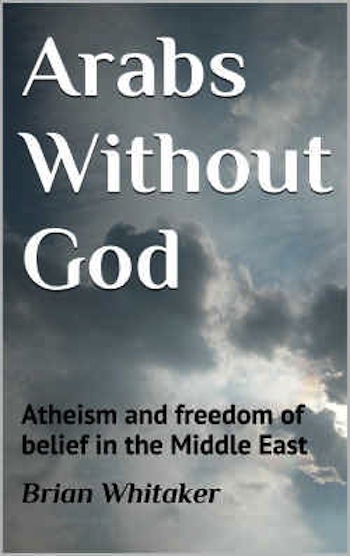By Brian Whitaker, author of Arabs without God
In the midst of sectarian turmoil in the Middle East, one section of Arab society rarely gets much attention: those who reject religion entirely. And yet such people do exist, their numbers appear to be growing and they are beginning to find a voice. Social media have provided them with the tools to express themselves and the uprisings that toppled Arab dictators have emboldened them to speak out.
But in countries where religion permeates most aspects of daily life, publicly challenging belief shocks families, society and governments. Many have been imprisoned merely for expressing their thoughts, others have been forced into exile and some threatened with execution. Many more keep their thoughts to themselves, for fear of the reaction from family, friends and employers.
Muslim societies have had their share of sceptics throughout the centuries but the atheism and agnosticism now emerging, especially among the younger generation, is often the result of a more generalised disaffection. This is scarcely surprising, since religion in the Arab countries – far from being a private matter – has become heavily politicised and is responsible for many of the social restrictions that cause so much frustration, especially among the youth.
To believe in God or not, to practise a religion or not is regarded in many parts of the world as a personal choice – and nobody else’s business. In Arab countries, though, it’s a lot more complicated.
Aside from the laws against blasphemy and apostasy, and the way atheism is often equated with sexual immorality (making young non-believers unsuitable for marriage), religion is far more than a belief system: it’s a major component of Arabs’ identity. Embracing atheism may thus be seen as a betrayal of Arab society and culture, and everything they represent.
This helps to explain the shock – and fear – caused by openly-expressed atheist views, as well as the recent new law in Saudi Arabia which treats “calling for atheist thought” as an act of terrorism.
Much of this is about keeping up appearances – the pretence, largely illusory, of a “pure” Islamic society. There are plenty of Arabs, nominally Muslims, who don’t pray, who drink alcohol, and quietly exempt themselves from fasting during Ramadan. This tends to be accepted, except by extremists, so long as they don’t make a show of it. But declaring a disbelief in God is a different matter altogether.
Public discourse in the Arab countries has opened up considerably during the last few years. Many of the old taboos have been broken and things can be said in public now that would have been unimaginable only a decade ago. Despite that, religion is still generally treated as sacrosanct: directly challenging it or “shaking people’s faith” (to quote Algeria’s law) is the biggest and most untouchable of the remaining taboos.
This, in turn, raises important questions about how best to press for change. In the course of research for my new book, “Arabs Without God”, I spoke to a variety of non-believers. Some could be described as activists who openly question and confront religion in all its forms (as is their right). Others simply want a quiet life; they see no need to advertise their disbelief but resent being forced to comply with rules imposed by believers. Both of these approaches are fraught with difficulties, however, and may also bring their adherents into conflict with the law.
The result is that Arab non-believers face two separate but related struggles. One is their dispute with religion itself; the other is with societies and governments that refuse to accept their disbelief. This broader struggle for personal rights – freedom of thought, freedom of expression, freedom of conscience, and so on – is one that they share with millions of religious Arabs too, especially religious minorities. Anyone who does not conform to whatever happens to be the local religious orthodoxy is liable to fall victim to blasphemy and apostasy laws or sectarian prejudices.
The irony of this is that while believers and non-believers are on opposite sides where religious ideas are concerned they may also find themselves on the same side in the struggle for freedom of belief. A substantial part of the discussion in “Arabs Without God” is therefore concerned with broader questions of religious liberty which affect believers and non-believers alike.
Nevertheless, minority religious beliefs tend to be more accepted than atheism. There is some recognition of religious diversity, at least among the monotheistic faiths, even if prejudice and discrimination persist. Outright disbelief in God, on the other hand, tends to be greeted with general abhorrence. In lands where religion holds sway, the treatment of non-believers thus becomes the ultimate test: when an atheist can be accepted and respected as a normal human being, liberty will truly have arrived.
***
Brian Whitaker is a journalist specialising in the Middle East. He is the author of “Unspeakable Love: Gay and Lesbian Life in the Middle East” and “ What’s Really Wrong With the Middle East”, both published by Saqi Books. “Arabs Without God” is available in hard copy and as an e-book.




 © 2026 All Rights Reserved
© 2026 All Rights Reserved